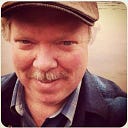We Remain Human When We Actively Connect to Others
Team Human by Douglas Rushkoff is a profound book that ties together the loose threads about the destructive forces at work in our culture and transforms them into a beautiful quilt of understanding.

Rushkoff is a professor, speaker, author, and an expert at making sense of our messy world. He brings forward the perspectives of a sociologist, historian, economist, artist, and media critic, and delivers an accessible, liberating book with the explicit message that we are interdependent beings who need one another to be happy and healthy citizens and heal our world.
He opens Team Human with this keen observation:
There’s a reason for our current predicament: an antihuman agenda embedded into our technology, our markets, and our major cultural institutions, from education to religion to civics and media. It has turned them from forces for human connection and expression into ones of isolation and repression. (page 3)
Rushkoff spends the next 200 pages describing in detail what he means by this and how to combat this collective slide into cultural oblivion. When he turns his lens on the technology industry, we can see for ourselves how we’re being set up to fail by the platforms and their transhumanist billionaire owners.
The internet’s tremendous social and intellectual potential was surrendered to short-term market priorities, turning a human-centered medium into a platform for manipulation, surveillance, and extraction. (page 94)
Ultimately, Team Human is a hopeful book. It’s also the kind of book that one may wish to read more than once. In this way, Team Human reminds me of The People’s History of the United States by Howard Zinn and The Four Agreements by Don Miguel Ruiz — books that can help change a person’s perspective forever.
Rushkoff ends the book with a strong call to action: “Find the others.” He believes this is our best chance for survival and for satisfaction (and I agree). We are social creatures, and we need more connections with nature and physical spaces where we can be together and help each other learn, grow, and heal.
All the better if the physical space advances arts and culture. Rushkoff attended film school prior to enrolling in a doctoral program. He knows the power of the arts (and the arts’ impact on culture) better than most.
Arts and culture give us a way to retrieve our lost ideals, actively connect to others, travel in time, communicate beyond words, and practice the hard work of participatory reality creation. (page 215)
Wow. I love the ideas and the phrasing above. “Actively connect to others” and “practice the hard work of participatory reality creation.” Hell, yes. Live music is best when the audience is actively co-creating the experience. The same concept is true for the best restaurants, art galleries, museums, coffee shops, and every other place where people intentionally gather.
